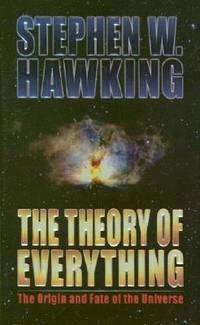

Table of Contents
Summary
Unlike the movie version of this title, the book summarises many important concepts and the evolution history of physics. Specifically, the book focuses on the theories of the universe’s beginning. Does the universe expand forever? Does it expand and contract like a bouncing ball? Was there even a singularity like the Big Bang? Did it happen once, or unlimited times as the universe expands and contracts again and again? Actually, did the Big Bang happen at all?
I went into this book as a non-science major. In fact, the first time I saw this book at a bookstore, I flipped a few pages and was immediately intimidated by all the cryptic terminology. I supposed that the reason this book was even placed at the featured section of the bookstore, was because of the popularity of the movie adaptation (if you can call it an adaptation. A story of Stephen Hawking is very different from a story of the universe).
But for some reason, maybe it’s the provoking title, maybe the thickness of the book is not so bad compared to its concepts, or maybe I just like the challenge, I consciously remembered the title and vowed to come back to it.
Working at a library now gives me ample opportunities to get any book I want at any time for free. So just a few days ago, I intentionally looked it up in the library system, pulled the book from its shelf, and read it.
Although Prof. Hawking was mostly stating the factual happenings of how different universe theories came to be and what they are, I’m not commenting on those theories in this review (not that I can remember all of them anyway). This review is basically a commentary on how this scientific book impresses an art person like me, and what I picked up from some of the other remarks by Prof. Hawking.

The Ever Evolving Academia
When it comes to the birth of new scientific theories, it is not always so scientific.
The word “science” gives the impression of logical, evidence-based minds coming up with solid facts after precise calculations and experiments. But if you have studied any subjects at a university, you would know science is a constantly evolving process.
And so to evolve, previous theories have to be challenged.
I’m not a science major- as I said before. But I do know the sort of pride carried by people in academia. And so when the doctors’ and professors’ theories get “updated”, they and their peers might get angry trying to defend the theories. I was also surprised by how many times in history, when theories were getting shot down because of how “shocking” they were. The person will even be told to switch to other areas of research instead of pushing it. Only when in later years, when other physicists’ findings support the same theory, that the person could finally come to the limelight.
But this is not so scientific, isn’t it?
Anyway, I’m also not sure about the process of developing a theory of the universe’s beginning, as the physicists are most doing calculations on their own. Unlike theories on psychology, medicine, chemistry, even other kinds of physics on gravity and energy and whatnot, where you can conduct experiments and see the results, the theories of the universe come from (at least from what I read from the book) calculations and discussions with other scientists. In such cases, I’m confused as to how they solidify their theories with evidence. I hesitate to call these armchair theories- just because I am more clueless than even an amateur in this field. But still, I’m confused.
How do you challenge the Big Bang theory?
God
The book also ties back to God a lot. There are multiple chapters’ with ending remarks like God would probably not exist if everything is truly governed by the laws of physics, or if the Big Bang (or Genesis, as interpreted by the church) did not happen because the universe is in a forever cycle of contraction and expansion.
Although I don’t think Prof. Hawking deliberately based his research on proving God’s existence or lack thereof, I think part of him remembered how some radical Christians treated him. He also wrote that he could relate to the old scientists like Copernicus and Galileo, who dared suggest the Earth circles the Sun and were persecuted. So whenever he had a new idea, his mind might drift to how people would respond.
The Thought of “We’ll be Long Gone by Then”
There was one remark at the end of one of the chapters that struck me. It goes along the lines like this:
By some billion years, as the universe expands and the stars burn out, no life would be sustained in such a condition. But we don’t have to worry about that, as humans would probably be by then, long extinct.
It is but terrifying. At the end of the day (or the end of time), in this vast universe, I’m just a speck of dust. In perspective, no matter how great or how small I become, it is still not significant in the grand scheme of things.
But it’s comforting and sublime, to bring that thought up when life seems to darken. Whenever failure happens, and shame prevents you to try again or carry on, remember that in the vast universe, it’s not that big of a deal.
The Poor Astronaut in the Black Hole: Mystery of the Universe
There is a recurring story in the chapters about the black hole; an astronaut falling into a black hole while his crew members from the spaceship watch on from afar (but not so far for the black hole).
As the black hole constricts everything within into singularity, it includes time and space. The astronaut would lose the sense of time and space (because time and space actually stop and merge), forever stuck in limbo.
I now get why some sci-fi fiction like to use the black hole as time-travelling portal.
It’s immensely interesting how the book informs me about how some research on cosmology was conducted. I’ve always wondered: how on Earth (literally) does one figure out the distance between the other planets from Earth? And not only the planets in the solar system, but some outside the Milky Way. Where does the estimated number of lightyears come from?
This is not physics nor quantum physics, but it got me interested in astronomy instead.
Conclusion
Despite not understanding 80% of the physics concepts (I failed my physics exam in secondary school), this is certainly an interesting read. I chuckled at the part where it mentions a physicist declaring that only a handful of people actually understand the classical theory of general relativity (also feeling sheepishly guilty for picking up this book).
Interestingly, it offers me less hard knowledge, and more perspective. Despite never before studying stars, I became curious of what lies beyond our small planet. Despite that my passion lies in writing and drawing, I look forward to what research and science will bring us in the years to come. And I suppose this curiosity is exactly what drives our ancestors- and now us- to explore, to inquire, and to learn.





